

Global Perspectives on Digital Health
Shubs Upadhyay
🌍 Global Perspectives on Digital Health
A podcast unpacking the stories, insights, and innovation shaping health systems and underserved communities.
🎧 Listen on Apple, Spotify. Watch on YouTube
A podcast unpacking the stories, insights, and innovation shaping health systems and underserved communities.
🎧 Listen on Apple, Spotify. Watch on YouTube
Episodes
Mentioned books
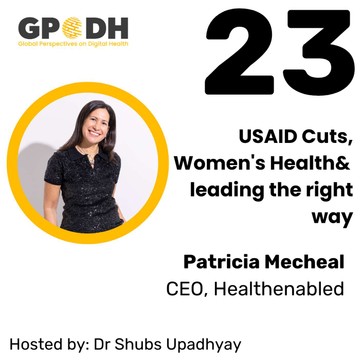
Jan 28, 2026 • 1h 7min
USAID cuts, women's health and leading the right way
At the end of last year I got the chance to record the first episode of the show in an actual studio. Still a lot to learn about this versus virtually, but Patty Mecheal was a gracious and very awesome guest. Patty, CEO of healthenabled brings nearly three decades of mHealth and digital health experience into this discussion we recorded during the Global Digital Health Forum in Nairobi in December 2025. After a tumultuous year of policy shifts with USAID funding, WHO shifts and the cascading challenges globally, our conversation examines how we got here and where we need to go when ethics and inclusivity are politically sidelined.What we cover:The state of 2025 - USAID cuts and their ripple effects on healthcare and digital health in underserved communitiesLessons from the 1990s to now - what patterns keep repeating, and what fundamental mistakes we're still makingWomen as decision-makers AND consumers - why this isn't just the "right thing to do" (though it is), but represents massive unmet market opportunityValue and context in evaluation - how to actually assess digital health and AI tools in ways that matterLeadership with values - Patty's honest reflections on what she's learned and gotten wrongBuilding responsibly when the incentives don't reward it - what does ethical implementation look like now?This episode is for you if you:Build digital health or AI solutionsMake policy or funding decisionsResearch or evaluate health interventionsAre working on impact in women’s healthUnfiltered, real insights from someone who's seen it all. Chapters and Timestamps00:00 Introduction to Global Perspectives on Digital Health01:24 Reflections on the Global Digital Forum04:03 Patti's Journey and Background08:20 Aha Moments in Public Health11:46 The Importance of Data in Health Interventions16:01 Learning from low resource settings21:55 Building Trust in Digital Health Solutions24:50 Balancing Scalability and Trust30:22 The Role of Compassion in Healthcare40:53 The Theory of Change in Digital Health46:13 Bootstrapping Innovations in Digital Health52:49 Compassionate Leadership and Ethical Practices57:08 The Role of Women in Health and TechnologyAbout Patty: Dr. Patricia (Patty) Mechael is a global digital health leader, speaker, and award-winning author with nearly 30 years of experience shaping equity-centered health and technology initiatives across more than 45 countries. She is Co-Founder and CEO of health.enabled, where she leads the Global Digital Health Monitor and Digital Health and AI Strategy efforts with Gavi, the Vaccine Alliance, WHO, UNICEF, and others. She is also a Senior Associate Professor at the Johns Hopkins Bloomberg School of Public Health where she serves as the Co-Principal Investigator for the Gates Foundation’s Digital Health Exemplars and where she also teaches a course on Gender-intentional Digital Health. Known for translating complex ideas into human, actionable insights, Patty writes and speaks widely on responsible AI, gender equity, and the future of work and health—bringing a grounded, compassion-driven leadership lens shaped by both evidence and lived experience.
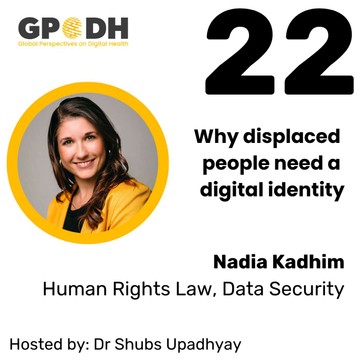
Jan 14, 2026 • 50min
Why displaced people need a digital identitiy
I sat down to talk to Nadia Kadhim, co-founder of Naq about digital identity and healthcare for displaced people. Nadia’s father was a refugee, and we hear about her journey into human rights law and eventually into data security and compliance. We cover:That digital identity for displaced people is messed up. How this creates very real barriers to care (with examples)How healthcare systems aren’t set up for real access or meaningful care for refugeesCan we even do anything about this when political agenda in many places cares less and less about this?Why, even so, we should wake up - the likelihood of us being displaced due to conflict or climate change is going up. How would we want to be cared for?This is an everybody problem, which is part of why it’s so hard to solve. If you’re into policy, data security, health and digital for displaced people, or building tools that could be being used by refugees, you’ll gain a lot from spending less than an hour on this topic. If you care about this topic you should also listen to the episode with Aral Surmeli. Inspiring in equal measure. Chapters 00:00 Introduction to Digital Health and Human Rights07:19 Data, Identity, and Access to Healthcare10:39 Challenges Faced by Refugees in Healthcare15:21 Real-Life Stories of Refugees and Healthcare Access20:32 Why no solution yet?23:01 The Future of Healthcare for Displaced People30:29 The Role of Funding and Multi-Stakeholder Approaches31:59 Data and Human Lives: The Health Data Poverty Problem34:22 Ethics and Regulatory Compliance in Digital Health38:22 Ownership and Security of Health Data43:13 Nadia's Recommendations for Policy Makers and Digital Health Founders----Global Perspectives on digital health shares the insights of innovators, donors, policy makers and researchers on what it takes to create impact at the last mile with digital health and AI in underserved communities around the world through audio and video. We’re telling the underreported stories of impact that the digital health industry needs to pay more attention to. There’s a growing back catalogue of over 20 engaging, inspiring and real conversations about the places in the world where the biggest challenges lie, but where the deepest impact in healthcare is happening. Tune in on gpodh.orgSubscribing and sharing really helps get this to the noggins of people who care about this topic. If you found this useful, please leave us a comment and some review stars.
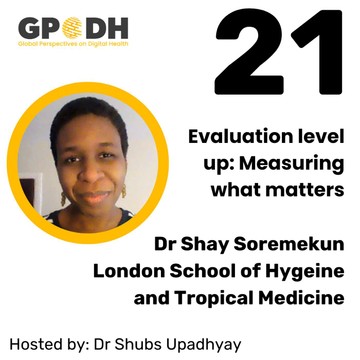
Nov 5, 2025 • 50min
Evaluation level up : Measuring what matters
🎯 Evaluation! A make or break thing in the digital health. I sat down with Dr Shay Soremekun from the London School of Hygiene & Tropical Medicine to talk about the very hot topic of evidence generation and evaluation. Everyone's talking about LLM evals, technical performance, benchmarking. But ultimately people care about impact. Yet impact is rarely a neat, linear path to a yes/no answer. Anyone who's actually implemented something in the field knows about all the other contributing factors, the daily challenges and how hard it is to move the needle on big clinical outcomes with robust clinical evaluation.To understand why it improved care, if it did, was as important, if not more important, than understanding that it did. Because that will help us to understand how we need to potentially modify or adapt the intervention either in the same place or in future places to be able to achieve the same success. 🌟 Who will benefit from listening to this episode?Digital health companies : Founders, data scientists, AI/ML scientists, PMs, designers, clinical evaluation/study teams, cliniciansFunders : donors, investorsGlobal and public health professionalsImplementersResearchersRegulatorsShay explains the use of Program Theory and Logic models to visually connect your intervention, all the intermediate steps (not just technology, but people and change) to outputs, outcomes and long term impact. Making space to observe other levers in the system you didn't initially anticipate. The work that Shay and her team have done with The Malaria Consortium and LSTM's Centre for Evaluation looking at a digital health tool for community health workers in villages and facilities showed this perfectly. Because they were intentional about observing the whole system, they discovered other factors contributing to impact and could redirect efforts accordingly.In this age of tightening budgets, and pressure to show clean shiny KPIs, how do you make room to observe these things? We also discussed decolonizing evaluation: capturing what's locally valuable, not just paradigms of success developed in comfortable offices and ivory towers.So many learnings here for understanding good co-design, implementation, and how to measure what matters.Chapters00:00 Intro04:15 Mozambique digital health tool for CHWs : context14:19 Tsking a system lens approach16:25 Measuring What Matters in Health Interventions23:02 Resourcefulness in Low-Resource Settings27:25 Challenges and Successes in Digital Interventions29:34 Proactive Measurement and Adaptation31:20 Scaling Up Successful Interventions32:59 Revolutionizing Evaluation Practices39:38 Incorporating Indigenous Knowledge in Evaluations44:57 Key Recommendations for Measuring What Matters 💡 Keep learning!If you found this episode helpful listen to:Episode 15 : Implementation 101 and how to Fail well with Caroline Perrin Episode 12 : Health First, Innovation second, with Smisha AggarwalEpisode 5 : What is the right approach for regulation and evaluation of digital health technologies?I have also written a Substack article summarising what I learned from this episode. Check it out for easy reference to the concepts outlined. Found it useful? Know someone who is struggling with this very thing? Share and keep raising the profile of people impacting underserved community globally. References and links to things we spoke aboutinSCALE papers:https://journals.plos.org/digitalhealth/article?id=10.1371/journal.pdig.0000235https://journals.plos.org/digitalhealth/article?id=10.1371/journal.pdig.0000217 Link for upSCALE (roll-out of project):https://www.malariaconsortium.org/projects/upscalehttps://www.malariaconsortium.org/resources/integrating-upscale-into-the-ministry-of-health Study protocol for Uganda and Mozambique:https://trialsjournal.biomedcentral.com/articles/10.1186/s13063-015-0657-6 Links to Chilisa Bagele – one of the most foremost voices on decolonial evaluation methodology so a good start for anyone interested (talk at LSHTM):https://www.lshtm.ac.uk/newsevents/events/decoloniality-and-indigenous-methods-global-health-evaluation-professor-bageleCentre for Evaluation Website https://www.lshtm.ac.uk/research/centres/centre-evaluation About Dr Shay SoremekunDr Shay Soremekun is an epidemiologist and co-deputy Director of the Centre for Evaluation at the London School of Hygiene and Tropical Medicine.Her research in child and adolescent health and development covers trials of low-cost disease prevention programmes, and identification of risk factors and mitigation strategies for poor developmental and economic outcomes in this group. She is a member of the UK Government Evaluation and Trial Advice Panel (ETAP), and sits on the steering committee for the John Snow Society. She lectures at postgraduate level on topics of evaluation, epidemiology and public health, and has developed and organises an MSc module in Study Design. LSHTM page: https://www.lshtm.ac.uk/aboutus/people/soremekun.shay
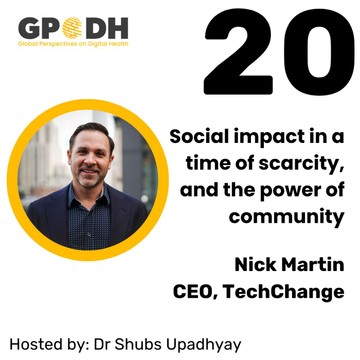
Oct 7, 2025 • 44min
Social impact in a time of scarcity, and the power of community
🚨 Nick Martin, social impact titan, one of the biggest voices out there in this space with a huge following and community, helping connect people to jobs, funding and much more. Founder and CEO of TechChange, working with funders, government and tech, and giving people the skills they need to create real impact. We’ve talked a lot about the impacts of the USAID funding cuts on this podcast. Nick, who has worked shares his view on the impact on grantees, humans and more. We cover:How do we deal with this new world order, and this new scarcity?What have we learned about the things that went well with USAID, and what could be better in the future?How do people affected think about their careers?How do organizations adapt their vision, strategy and tactics in a world of scarcity, and be sustainable through this perma-uncertainty. We also talked about the upcoming Global Digital Health Forum, a gathering that has been going strong for years, and why this year feels particularly important to bring people in global and digital health together. The next one at the time of recording is 3-5 December 2025, online and in Nairobi in person. If you're into Global Digital Helath and underserved communities, this is a great gathering to attend.If you are working in this space, dealing with the uncertainty, either as an organization or an individual, then this podcast is for you. Nick shares some of the wisdom and insights he has gained over the years, and why community across borders is such an integral part of how we shape what global digital health looks like in the next 10 years. Check it out - share with others working in the space. Leave us a comment or review - it really helps us reach more people. 00:00 Intro : Nick's story03:58 USAID cuts. Before, during, after : reflections from the development sector21:13 Career transition advice24:14 Funders need to step up more, but it's not that simple26:34 TechChange origins28:22 The Global Digital Health Forum : bringing people together34:30 Fail festivals and creating the space to talk about failure38:56 Wisdom corner : Nick's top tipsLiked this episode? What to listen to next:- Episode 15: Implementation 101 and how to fail well- Episode 16 : How the WHO is evolvingWhat to read next:Check out my Substack : Can Global Health and Venture Capital Get Along?About NickNick Martin is the Founder and CEO of TechChange, a social enterprise that has become a leading provider of digital health training and convening solutions worldwide. Under his leadership, TechChange has trained thousands of Ministry of Health officials in more than 90 countries through flagship programs such as Digital Health: Planning National Systems, developed in partnership with USAID, WHO, and Digital Square. He also leads the Global Digital Health Forum, the premier annual gathering for policymakers, donors, researchers, and implementers working at the intersection of technology and health. With two decades of experience in global development and public health, Nick has built partnerships with organizations including USAID, UNICEF, WHO, and the Gates Foundation. His work has been featured in outlets such as The Economist, Forbes, The New York Times, and Fast Company, highlighting his role in advancing digital health and social impact through technology.
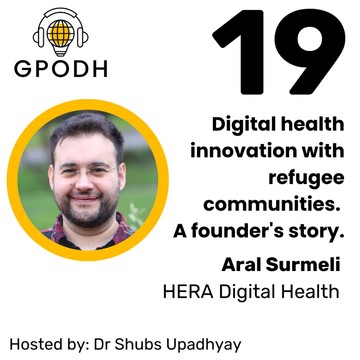
Sep 9, 2025 • 52min
Digital health innovation with refugees. A founder's story.
As underserved communities go, refugees are up there as the most vulnerable. We already have systemic and deep challenges for physical health services not being designed for displaced people, and has we rush to bolt on digital and LLMs to everything, are we stopping and thinking about the key needs of these communities?And a word on innovation in humanitarian settings. This is not a problem that investors go for with attractive returns, or something you can meet the market where it is at. Rather, its down to governments and philanthropy to help invest in this. Aral recounts the massive challenge HERA have had to overcome after USAID funding was cut and how he has navigated and needed to prioiritize after the stop work order. Aral is the founder of HERA Digital health. HERA have built a tool that serves Syrian refugees in Turkey - targeted initially at mothers to be and mothers with young children, who, in the mess of trying to rebuild any semblance of routine in refugee camps would miss key antenatal or child development appointments. Aral saw the problems the community were having, and as a doctor in the ER in Turkey saw the downstream effects of this. Some key takeaways for me:In humanitarian settings, context is not static and always changing. HERA hired developers who were in the refugee camps - short feedback loops and people immersed in the context. This is a great example of 'Build with, not for"The communities he is serving do not get to quit, why should heDefining what success is in this context - it is not about HERA surviving, or Aral being successful, but the work, and the impact to those people. So he is optimizing decisions for that - and this means he can be open to other options. This episode is not a shiny rainbow story, but one about real struggle. Aral is still on the path of struggle and working to navigate through. If you care about what he is doing, seriously, get in touch with him.Chapters00:00 Introduction to Digital Health Innovations05:05 The Journey of Aral Surmeli: From Medicine to Tech07:47 Understanding Refugee Health Needs10:13 Building HERA: The Digital Health Tool18:23 Cultural Sensitivity in Health Solutions28:01 Navigating Challenges in Humanitarian Innovation30:50 Funding Dilemmas in Humanitarian Contexts36:01 Adapting Strategies for Sustainability44:03 The Role of Digital Identity in Healthcare46:51 Finding Hope Amidst Challenges48:50 Advice for Aspiring Humanitarian InnovatorsAbout Aral:https://heradigitalhealth.org/Dr. Aral Surmeli is the Founder and CEO of HERA Digital Health, a nonprofit organization that helps refugee women and children access local healthcare through AI-powered digital tools. With a strong foundation in humanitarian health and digital innovation, Dr. Surmeli has led HERA to serve over 300,000 users, providing services like immunization reminders, prenatal care tracking, and digital health records—accessible even in low-connectivity settings via WhatsApp and offline apps.HERA began its work in Turkey with Syrian refugees and is now expanding across the Middle East and Africa. The platform is open source, co-designed with local healthcare workers and refugee communities, and integrates with national health systems and NGO services.Dr. Surmeli holds an MPH from Harvard University and is currently pursuing a DrPH at Johns Hopkins University. He is a former Innovation Fellow at Harvard Humanitarian Initiative and has been supported by organizations such as Google.org, Grand Challenges Canada, MIT Solve, and Harvard iLab. HERA was recently a finalist at the AI for Good Summit's Impact Awards, and Dr. Surmeli is an active voice on the intersection of AI, digital health, and humanitarian response
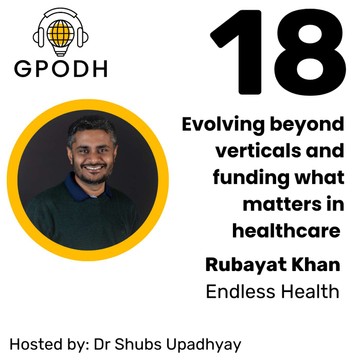
Jul 29, 2025 • 1h 2min
Evolving beyond verticals and funding what matters in healthcare
🔍 I speak with Rubayat Khan, a systems thinker, entrepreneur, and now investor at the Endless Foundation, where he is helping reimagine how global health innovation is funded and delivered.We unpack what it means to move beyond vertical health solutions, how to prioritize innovation in an era of shrinking aid budgets, and how large language models (LLMs) might be the missing piece in unlocking integrated, people-centered care especially in low-resource settings. We also talk about the challenges, risks, pitfalls and how to think about the right counterfactuals for the context when we evaluate LLMs in healthcare.Rubayat brings the rare perspective of someone who has been a patient, builder, and funder, and who now advocates for rethinking everything from clinic hours to global incentive structures.🔑 In this episode:Why governments are not always best placed to design people-centered care : an example of this was the fact that government run clinical in villages in rural Bangladesh were only open 10am till 2pm. And so nobody would access them as people are working on the fields or caring for their family. Four priority areas Endless Foundation is focusing onHow LLMs could shift access, quality, and cost curve if implemented thoughtfullyWhy self-care is the blind spot we can no longer afford to ignoreThe dangers of "digital colonialism" and what needs to change in global AI governanceWhat funders can do differently to support impact beyond rhetoric🗣️ Key Quotes“Most of what we call healthcare happens outside clinics. If we ignore that, we miss the biggest opportunity for real impact.”To paraphrase Rubayat:"A consultation with a doctor in Bangladesh averages 48 seconds. There should be little surprise that people (including Rubayat's parents!) find value and better quality information with a LLM than they would in their own contexts. So much valuable insight for people who are building, or wrestling how to invest or fund the right interventions for last mile impact in LMICs. 🎧 Listen if you’re:A global health funder or innovator rethinking priorities post development cutsA builder working on AI in healthcareA policymaker exploring people-centered designAn innovator aiming to solve real problems in underserved settingsShare, subscribe, comment, leave us a 5 star review. It really helps us reach people who would find this useful. About RubayatReubayat's Substack: https://rubayatkhan.substack.com/Rubayat Khan is a health entrepreneur and technologist from Bangladesh and currently Director of Health Programs at Endless Network, a US family foundation. Prior to Endless, Rubayat co-founded mPower Social Enterprises and Jeeon, which have both pioneered innovative models for delivering healthcare and other essential services to last-mile populations across 15 countries, currently reaching over 120 million people. Rubayat is a passionate advocate for bottom-up and user-centered thinking in global health, and has written extensively in leading global publications like the Guardian, SSIR and Frontiers in Public Health. He is an Acumen and Aspen New Voices Fellow, and is currently based in Baltimore with his wife and two children.
(00:00) - Introduction
(08:33) - Navigating the Challenges of Healthcare in Bangladesh
(10:46) - Transitioning from Ground-Level Solutions to System-Level Thinking
(18:07) - Identifying Key Challenges in Global Health Systems
(23:20) - Seizing Opportunities Amidst Crisis in Global Health
(29:30) - Leveraging AI and Technology for Healthcare Transformation
(37:49) - AI vs Human Decision-Making in Healthcare
(41:26) - Evaluating AI in Healthcare Contexts
(44:07) - AI's Potential in Low-Resource Settings
(46:47) - Concerns About Digital Colonialism and Data Ownership
(51:05) - The Need for Coordinated Leadership in Healthcare
(54:26) - Finding the Right Problems to Solve

Jul 8, 2025 • 55min
Healthtech comms. Communicate your impact
Your Metrics Don’t Matter If No One Gets the Message : Health Tech Comms with James Somauroo of SomX. Listen on Apple, Spotify. Watch on Youtube. We cover one of the most overlooked drivers of success in health innovation: communication. Our guest, James Somauroo, has hosted over 400 podcasts and built one of the most influential media and communications agencies in health tech. His work spans startups, Big Tech, life sciences, and everything in between, helping organizations craft messages that resonate, build trust, and drive impact.We explore why so many well-intentioned digital health projects struggle to scale. Not because the tech or evidence isn’t good enough, but because the story isn’t being told in a way people understand or care about.🧠 What You’ll Learn:Why comms is a massive unlock all the way from policy, implementation to on the ground innovation. How to go beyond metrics to communicate real value and outcomes. Thinking about 2nd and 3rd order effects the way journalists do. What makes a pitch deck land with donors or investorsThe power of giving people value in content to stand out. Don't just try to beat the algorithm!🎧 Who Should Listen:Anyone trying to change people's mindsHealth tech founders, especially those working in low and middle-income countriesGlobal health implementers, policymakers, and fundersAnyone trying to drive adoption, trust, or policy buy-in for digital health solutions📣 Subscribe, Connect & Share:If this episode resonated with you, share it with someone trying to make their work land more powerfully — whether with partners, funders, or frontline teams. And let us know your biggest takeaway on LinkedIn👋🏾 About ShubsDr Shubs Upadhyay, the podcast host is a Primary care physician who has worked across policy, AI product leadership, and evidence comms. Shubs brings clinical leadership to help founders and investors focus on and communicate real value in healthcare. Get in touch at shubs.me and hello@shubs.meAbout JamesJames is the cofounder and CEO of SomX, a communications and creative agency for healthcare companies. He hosts The Healthtech Podcast and is the Editor-In-Chief of Healthtech Pigeon. He is an anaesthetics and ICU doctor by training, has held roles in leadership, management and innovation at NHS England, Health Education England and the British Medical Journal and previously directed two healthtech startup accelerators. He has degrees in medicine, biomedical sciences and education and is a guest lecturer on healthtech innovation and entrepreneurship at academic institutions around the world.
(00:00) - Introduction to James and SomX
(07:51) - The Evolution of Health Communications
(13:12) - State of Comms in Digital Health
(18:20) - Navigating the Attention Economy
(21:00) - The Importance of Authenticity in Content
(23:41) - Psychology in Marketing and Communication
(31:11) - The Role of Emotion in Decision Making
(32:48) - Transforming Scientific Communication through Storytelling
(37:09) - Crafting Compelling Narratives for Impact
(43:59) - Communicating Evidence Effectively
(48:28) - The Importance of Sharing Failures
(52:10) - James' quick fire tips
(00:00) - Chapter 13
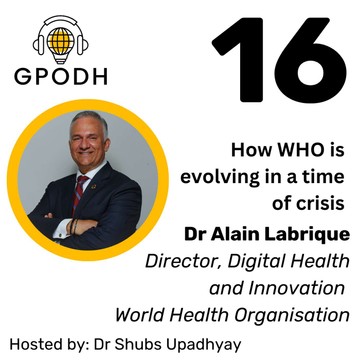
5 snips
Jun 11, 2025 • 57min
How the World Health Organization is evolving
A conversation on the future of the World Health Organization, rethinking how we approach digital implementation and funding in LMICs, and what it really means to decolonize global health.“Countries need to be in the driver’s seat of their own development agenda… The earmarking of assistance has to stop.” - Dr. Alain Labrique, Director, Digital and Innovation, World Health OrganizationAbsolutely chuffed to have had the chance to speak with WHO Director of Digital Health and Innovation, Dr Alain Labrique. That he’s also a listener of the podcast? Even better.Alain is an engaging storyteller, shaped by a childhood in the streets of Dhaka and decades spent advancing implementation science to reach underserved communities.We spoke at length about the unfolding crisis in healthcare delivery in many settings that have relied heavily on development funding. While the impact on clinical services has received attention, Alain highlighted a deeper, less visible collapse: the quiet failure of digital infrastructure: servers, IT systems, and backend platforms now left unfunded and unsupported.At the same time, WHO itself is navigating similar pressures: budget cuts, shifting priorities, and an urgent need to re-focus. Alain offers a refreshingly honest take on what comes next for WHO and how the organization can stay relevant in a rapidly changing world.Crucially, it's inspiring to hear a leader from such an influential institution speak with clarity and conviction about shifting power, building local ownership, and rethinking how global health is funded and framed.On our episode on AI ethics with Jess Morley, she spoke about how rhetoric shapes collective mindsets and changes behavior and markets. This conversation with Alain is, in my view, the kind of rhetoric we need more of.00:00 Introduction and Background of Alain Labrique12:05 Development funding cuts impact on digital infrastructure24:01 What future funding mechanisms need to consider27:26 The Role of Private Sector in Health Infrastructure31:14 Responsible Partnerships in Health Innovation33:00 The Evolving Role of WHO in Digital health now38:21 Building Capacity and Governance in Health Systems40:41 Navigating AI in Health Care46:22 Learning from Failures in Health Initiatives50:27 Advice to Founders building in Underserved Communities
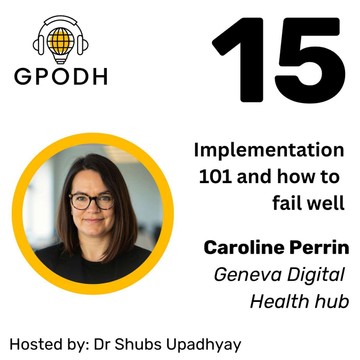
May 14, 2025 • 46min
Implementation 101 and how to fail well
Implementation. What does it mean? Why is it hard? How do we get it right? Failure. Are we, in Global Digital Health, thinking and acting in a way that doesn't help us move forward?Caroline Perrin, Director of the Geneva Digital Health Hub joins us on the Global Perspectives on Digital Health podcast to share her views on this. This episode is for the people doing the work to ensure digital health tools actually work for people.It's about the messy realities - people, process, managing change and looking to constantly improve as our assumptions get updated. How to work through the hard, day to day challenges towards real outcomes for people experiencing and delivering care.We hear about: How the Geneva Digital Health Hub's Implementome maps out implementations across the world, especially the Global south and brings together a Community of people wrestling similar problems for knowledge exchange and connectionThe key challenges in getting digital health tools adopted, and how to use good implementation principles to get through the messy, day to day realitiesChallenges in Monitoring and Evaluation, and how to get the balance right between impact on what matters and what is in your locus of control. How our industry and ecosystem needs to rethink how we talk about failure, and how we're opening up this conversation at the Geneva Digital Health day on 22 May 2025Plus some great examples and ways you can share challenges to contribute to the ecosystem. Links:Building and Implementing? Join Implementome: https://gdhub.unige.ch/implementome/mainDigital Health Atlas: https://gdhub.unige.ch/implementome/projectsGeneva Digital Health Day: https://gdhub.org/25gdhd/Implementation Reports: https://medinform.jmir.org/themes/145-implementation-reportiCHECK-DH Guidelines: https://www.jmir.org/2023/1/e46694Chapters (with quick links)00:00Introduction to Digital Health and Geneva Digital Health Hub07:40Understanding Implementation in Digital Health12:22A community of implementors20:09Approaching Implementation as Founders and Developers26:19Monitoring and Evaluation Challenges32:45Future of Digital Health in Underserved Communities35:31Navigating Uncertainty in Digital Health Projects38:45Rethinking Success and Failure in Health Evaluations45:46The Need for a Paradigm Shift in Global Health49:53Creating Safe Spaces for Sharing Failures54:04Building Communities of Practice for Learning57:30Finding Hope in the Face of ChallengesAbout CarolineCaroline Perrin is the Executive Director of the Geneva Digital Health Hub (gdhub) and has over 15 years of experience in digital innovation, programme management and multi-stakeholder collaboration. She specialises in using technology to improve the efficiency, sustainability and impact of health care. With a PhD in Global Health, a Master's in Information Systems Management, and a Bachelor's in Business Administration, she has led large-scale digital health initiatives and worked with governments, international organisations, and the private sector to drive innovation and policy alignment. Previously, she was a project manager for the RAFT telemedicine network and the Geneva University Hospitals eHealth and Telemedicine Service, focusing on the development and evaluation of digital health solutions to strengthen health systems. Caroline is passionate about bridging technology, strategy and policy to create scalable, high-impact solutions.Help GPODH growSubscribe, leave us a comment on Youtube or your podcast player if you found this useful. It really does help us grow and reach the right people who would benefit from this podcast. Who would benefit from this in your network? Please share the love 💕Find out more about me and read my Substack: https://shubstack.substack.com/
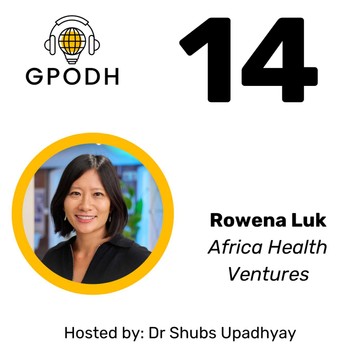
May 7, 2025 • 1h 4min
From crisis to revolution. Why Africa's moment is now, a healthtech VC's case.
A healthtech investor's view on healthcare in Africa in the next 10 years. If you’re building or investing for impact with underserved communities in Africa, this episode is for you. Rowena Luk has walked the talk. She is the ‘OG’ of creating visibility on digital health in Africa, and has built and scaled for impact in over 40 countries on the continent, and has now scaled her own impact to support founders through her VC firm Africa Health Ventures. This episode covers so much, especially the challenges that Africa faces through development aid funding cuts. Rowena is bullish about where healthcare in Africa can get to, and makes a measured and compelling case for why this is a real moment to turn crisis into opportunity, and how the right mindset from VCs can help create resilient businesses that can scale and realize real health outcomes. I’ve often been vocal and skeptical about how hyper-fixated our industry is on financial aspects of value, and we discussed this at length. Rowena definitely altered my perspective.My highlights:This is Africa’s moment. Rowena’s case for investing and the hard metrics business case is pretty compelling. It is not always the case that VCs look at the short term only. In fact, philanthropy and development funding cycles themselves are short, and good VCs have a 10+ year view and look at broader value.You have to meet the market where it’s at. My takeaway: Africa is not homogenous. Do the work to know what is needed right now, and build a path to where you want to get. If you’re a US or Europe based investor looking to invest in Africa, check your biases and leave your mental models at the door. Things are different here, in a good way. Useful advice for people building and investing in AfricaThe importance of investing in distribution and infrastructure. My read: You might have the perfect tool, but it’s hard to get hospitals and institutions to even know about them, let alone maintain, find payment models and have a path to adoption.Chapters00:00 Introduction to Digital Health in Africa04:36 Rowena's Journey in Digital Health06:43 The Investing landscape in Africa13:19 The case for VC investment over philanthropic funding20:47 Reimagining healthcare in Africa : building resilient health systems26:00 Do VCs see value beyond financial returns?29:08 Myths and Realities of Investing in Africa36:14 Understanding Investment Biases in Africa38:39 Identifying Market Needs and Product Diversity40:44 Evaluating Healthcare Solutions and Market Readiness42:22 Spotlight on Innovative Startups46:26 Learning from Past Experiences51:56 Key Tips for Building in Underserved Communities54:30 Getting Started with Impact Investing54:54 The Future of Healthcare in AfricaAdditional ResourcesIf you're a healthcare founder, investor, or donor in Africa, check out the Africa Health Ventures monthly newsletter. It includes grant and investment opportunities, events, deals, notable startups, and industry news. Subscribe at AfricaHealthVentures.com/Newsletter.About RowenaRowena Luk is the Managing Partner of Africa Health Ventures, a pan-African seed fund investing in healthcare innovations that will dramatically improve access and quality of healthcare on the continent and around the world. She is a healthtech founder, entrepreneur, and software engineer. She has deep experience scaling healthtech in 40 countries across Africa, including products adopted at national and international scale. Previously, Rowena was a Director at Madiro, an impact fund investing in healthcare in Africa; CSO at Dimagi, a social enterprise deploying digital health to 130 countries, and founder of a digital health nonprofit in West Africa. She hosts the Africa Health Ventures Podcast and lives with her family in beautiful South Africa. Help GPODH growSubscribe, leave us a comment on Youtube or your podcast player if you found this useful. It really does help us grow and reach the right people who would benefit from this podcast. Who would benefit from this in your network? Please share the love 💕


